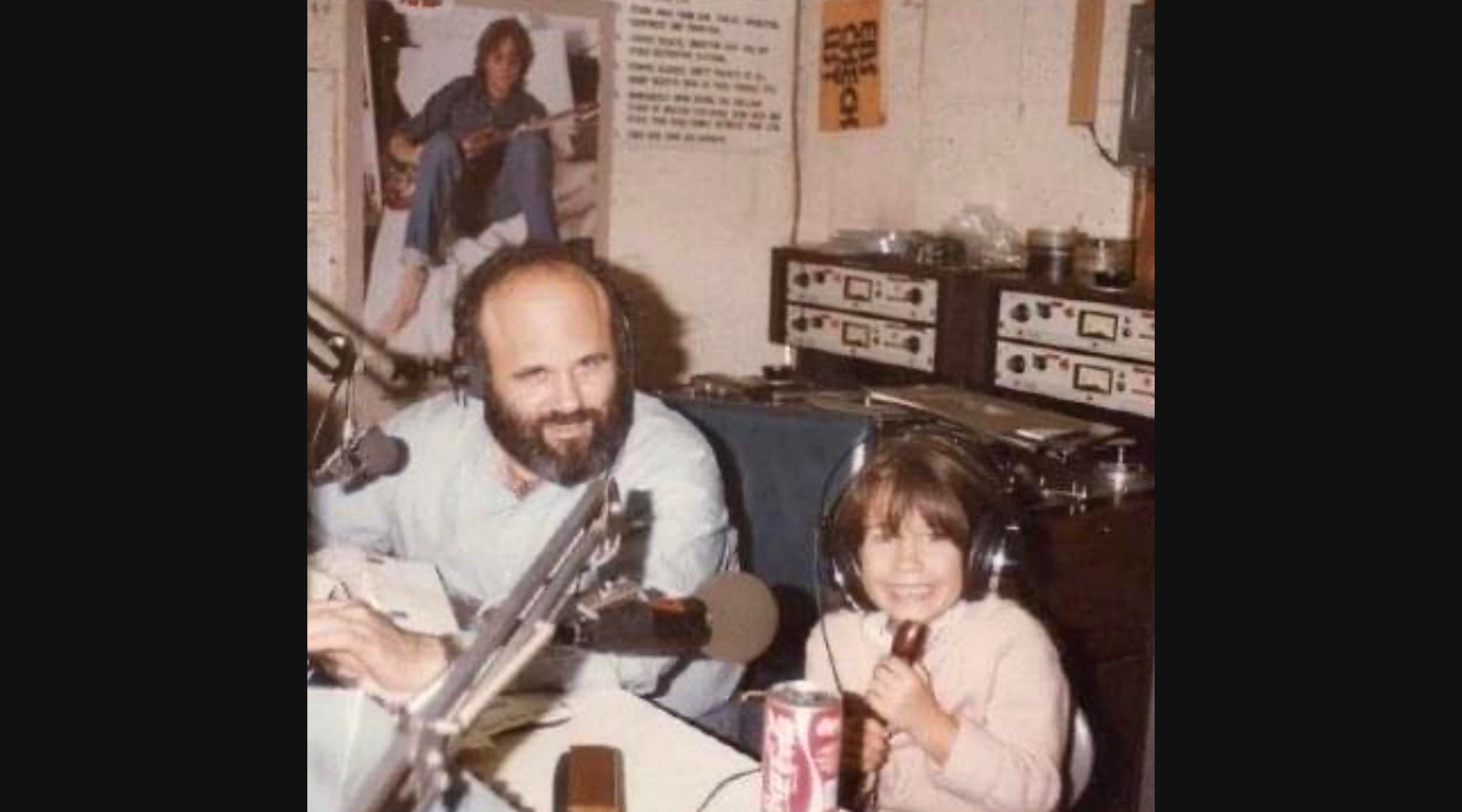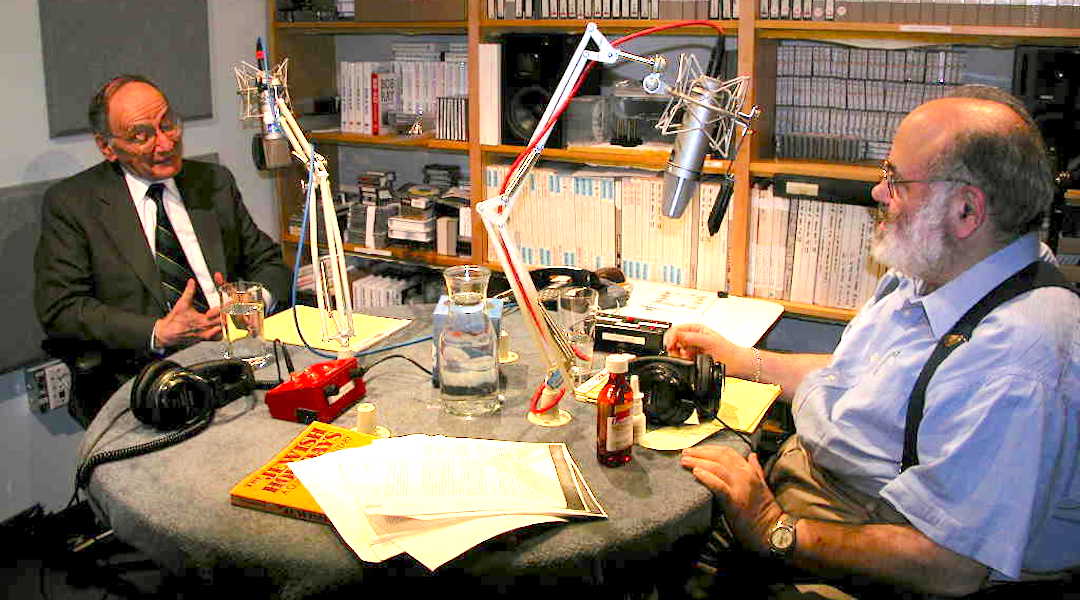(New York Jewish Week) — Larry Josephson, who as both on-air host and manager of New York’s radio station WBAI helped define the genre of free-form, politically progressive radio in the pre-digital age, died at the age of 83 on July 27.
The cause of death was cardiac arrest, his daughter Jennie Josephson told New York Jewish Week. He had spent more than a year in hospitals and nursing homes.
In addition to a chatty, confessional and often grumpy style that anticipated radio personalities like Howard Stern, Josephson’s 50-year career as a prolific radio producer included two series focused specifically on the Jewish community: “Only in America: The Story of American Jews,” which included an interview with Ruth Bader Ginsburg, and “What Is Judaism?”, a series of hourlong conversations with then Jewish Theological Seminary chancellor Rabbi Ismar Schorsch on the history and rituals of Jewish holidays.
“Larry the J,” as his BAI colleagues referred to him, had a very real and substantial connection to Yiddishkeit late in life, unlike other Jewish trouble-makers of the counterculture who have passed in recent years.
Schorsch, 86, noted that his conversations with Josephson — heard locally on public station WNYC — went on for several years.
“I think our conversations prodded him to adopt some Jewish practice,” Schorsch told the New York Jewish Week. “For him, it became clear that Judaism was not a theoretical system. It was a system that imprinted its values and sensibilities in practice. He definitely was tempted to live Judaism and not simply think about it.”
Josephson joined the Society for the Advancement of Judaism, a Reconstructionist congregation in his Upper West Side neighborhood, at the suggestion of Schorsch’s assistant.
One of the congregants, Ron Kushner, worked with Josephson at IBM in the mid-1960s and listened to his morning show on WBAI.
“I admired his contrariness,” said Kushner.
Kushner said that Josephson never learned Hebrew and complained that he couldn’t follow along during services, “but he seemed to enjoy being there.”
Robert Krulwich has been a friend since Josephson hired him in 1974 as the Washington bureau chief for WBAI’s parent network, Pacifica. Krulwich, the former co-host of the program Radiolab, said another aspect of Judaism that appealed to Josephson was the tradition of asking questions and telling stories.
“Judaism is about commandments and laws, and don’ts and mustn’ts and musts,” Krulwich wrote in a text. “But behind the rules there is a stubborn urge to ask questions, to wonder out loud, to challenge and probe. And Larry was good at the probing and the storytelling that explores the questions. As uncomfortable as he was with the strictures, he loved the stories.”
Josephson not only told stories on the radio, he once told some before a live audience. His 2012 solo show at the Cornelia Street Café was titled “An Inconvenient Jew: My Life In Radio.” Referring to his time at countercultural WBAI, Josephson told a packed room of graying baby boomers, “I was saved by this crazy, farkakte radio station.”
Raised in Los Angeles, he worked as a systems analyst and programmer with IBM until, restless in the budding tech field, he moved to New York City to take a volunteer slot at WBAI, a listener-supported radio station, where he eventually served as station manager from 1974 to 1976. The station was once described as “both an expression, and ringleader, of the counterculture during its peak in the mid-1960s through the Vietnam War.”
At BAI he became famous for audibly eating a bagel and sipping coffee during his morning show, “In The Beginning,” which began in 1966. Josephson was one of the station’s free-form hosts who at times discussed deeply personal matters on the air. When his 18-month-old daughter Rachel died of congenital heart disease in 1972, he played The Beatles song “Let It Be” and poured his heart out to listeners. A 2014 online memoir, published on the occasion of his 75th birthday, included this line about Josephson’s work as a producer: “The best [thing] I’ve ever produced are my four children (one in Heaven, the others in California, formerly heaven).”
He later championed the work of radio comedians Bob Elliott and Ray Goulding, producing a public radio show that revived their career in the mid-1980s.
His daughter Jennie, who followed her father into broadcast journalism and podcasting, said his return to Judaism was a surprise to everyone, “especially his family out in California, because he really rejected that.”

Larry Josephson with his daughter Jennie at WBAI studios. (Courtesy Jennie Josephson)
Although Jennie Josephson doesn’t consider herself Jewish, she said the best part of Judaism is the sense of community, “and that was in Larry’s DNA from the beginning, the community support. He was always creating community, the WBAI community, the public radio community. In the end that’s what he was looking for.”
She’s currently disposing of much of the furnishings in his spacious Central Park West apartment. During a one-day shiva on Sunday, radio colleagues were offered gear from the recording studio in the apartment. Josephson is looking for a home for the hundreds of books about the Holocaust and Jewish life in America her father amassed while working on the two Jewish radio series.
“I cannot take them to The Strand,” she said. “I need to find a home for the books.”
She wants the books to be kept together as a collection and will donate copies of the Jewish radio programs her father produced along with the books.
Because Josephson’s web site has been down for an unknown period of time, she will post the two Jewish radio series on her own web site.
Despite his on-air success, Josephson struggled financially over many years. The recording studio in his apartment run by his non-profit, The Radio Foundation, lost much of its business when the pandemic arrived. Even when there were plenty of bookings by public radio shows and podcast producers, the operation was in the red. Josephson credited two former WBAI associates with keeping the studio afloat: Carolyn Goodman, a former station board member and the mother of Andrew Goodman, one of the three civil rights workers murdered in Philadelphia, Mississippi in 1964; and Ed Goodman, a former WBAI station manager who went to jail rather than hand over subpoenaed tapes of a phone call to the station during the 1970 uprising at the Manhattan jail known as The Tombs.
In 2018 a GoFundMe campaign organized by Josephson’s close friend Marty Goldensohn raised close $28,000 to pay for home health care aides for Josephson. Many of the contributors expressed love and admiration for Josephson. One woman, a journalist affiliated with NBC, wrote: “I donated because…. Hell, It’s Larry Josephson.”
In addition to his daughter Jennie, Josephson is survived by another daughter, Rebecca, a stepson and two grandchildren.
A memorial is planned for later in the year.
The New York Jewish Week brings you the stories behind the headlines, keeping you connected to Jewish life in New York. Help sustain the reporting you trust by donating today.





